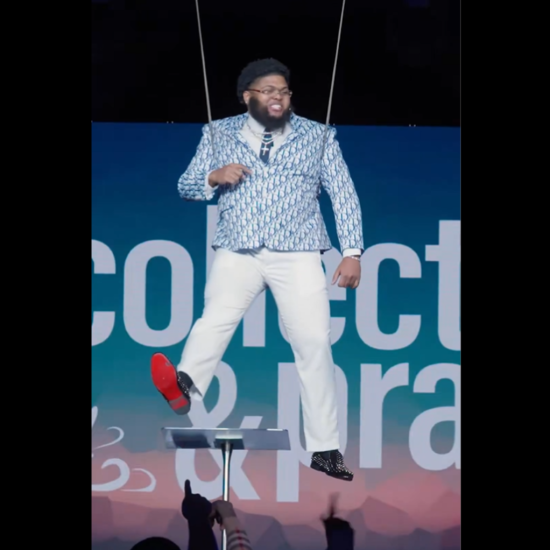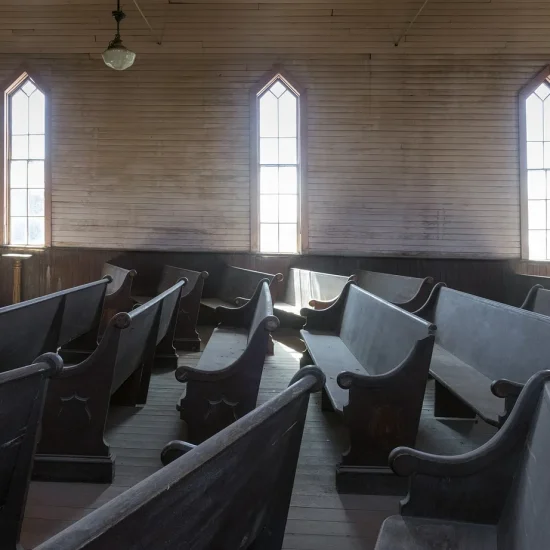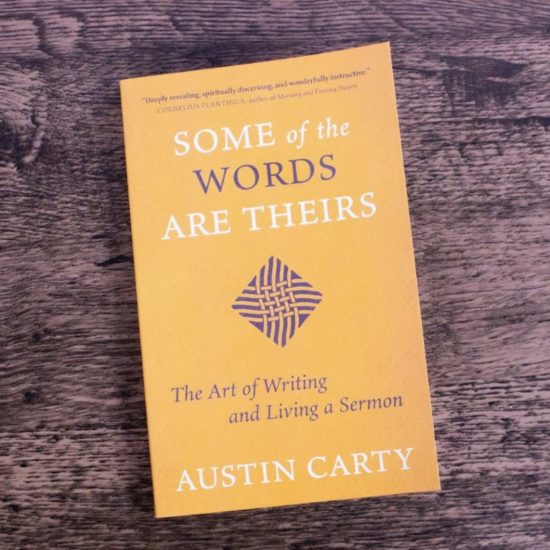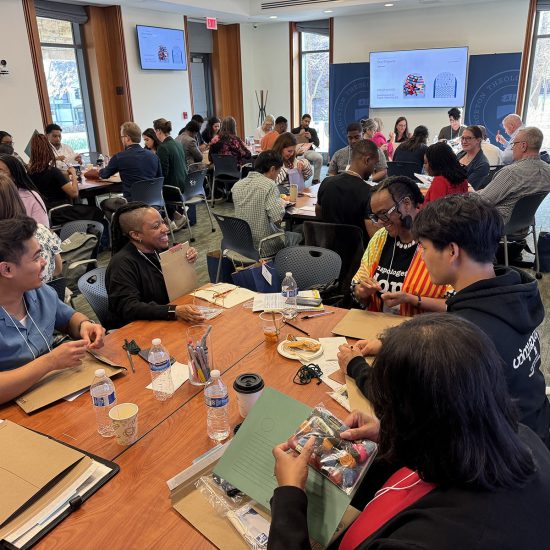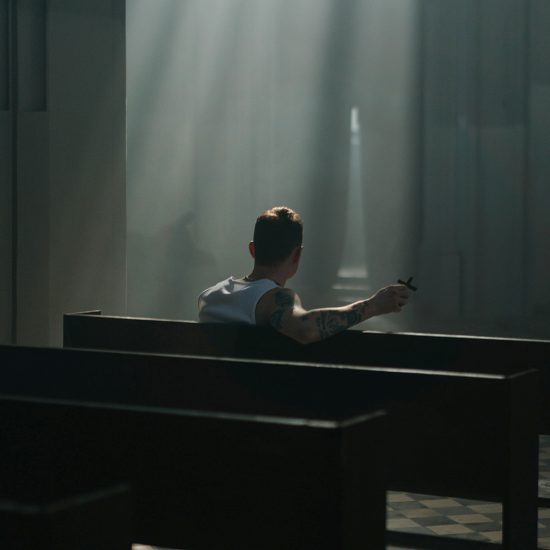Though the fig tree does not bud and there are no grapes on the vines, though the olive crop fails and the fields produce no food, though there are no sheep in the pen and no cattle in the stalls, yet I will rejoice in the Lord, I will be joyful in God my Savior. (Habakkuk 3:17-18, NIV)
By Vicki Brown, Word&Way Associate Editor
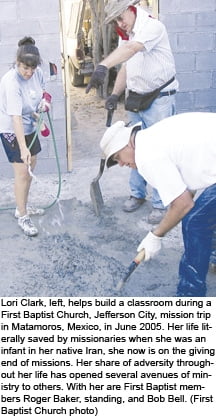 In Old Testament times, the Hebrews measured God's goodness and their success by the fruit of their labor in the fields. Habakkuk was able to declare that even if he lost everything, God would still reign in the prophet's life.
In Old Testament times, the Hebrews measured God's goodness and their success by the fruit of their labor in the fields. Habakkuk was able to declare that even if he lost everything, God would still reign in the prophet's life.
In the face of child abuse, domestic violence, divorce and the loss of a child, modern-day Habakkuk Lori Clark of Jefferson City rejoices that "God is my leading and has gotten me through everything from Day 1."
Born in Iran to Muslim parents, Clark almost lost her life before she had a chance to live it.
Her parents traveled from village to village with a caravan. They were camped in a village where Foreign (now International) Mission Board missionaries had established an orphanage to rescue female infants and children whose parents did not want them simply because they were girls.
Shortly after Clark's birth, her father killed her mother because she had given birth to a girl. He would have killed Clark as well, but decided to accept the missionaries' offer of a batch of homemade chocolate chip cookies in trade for the infant. They changed the child's birth name from Moluk to Molly and because they didn't know exactly when she had been born, gave her a birth date.
Two years later, the missionaries' shared stories about children in their care in an Illinois church, and a couple decided to adopt two little girls, including Clark.
The process took three years. Finally at 5 and 1/2 years old, Molly came to the United States. Her adoptive parents changed her name to Lori. At the time, the two girls were among the last children the Iranian government allowed to be adopted by foreigners.
Although memories of her time in the orphanage are sketchy, Clark remembers that the missionaries conducted worship services for the villagers and "they taught us children the stories."
'…I was the lost lamb….'
Lots of sheep decorate Clark's office at First Baptist Church, Jefferson City, where she is ministry assistant to pastor of missions and evangelism David Phelps. "The story I remembered in English was of the lost sheep, and I remembered the painting of Christ holding the lamb," Clark said.
"I felt I was the lost lamb. That's the image I've always held…. It has brought me great comfort at times."
She relied on that comfort in her new stateside home. Shortly after the girls arrived, a cycle of violence and abuse began. "My parents weren't equipped to be parents," she said. "I can't imagine how I would have survived if it had not been for Christ."
During a particularly violent episode with her mom, Lori was convinced she was going to die. She was 10 years old. "I thought I would die. I've always talked to God as a friend, and I told Him I was coming home," she said.
But God spared her a second time.
Finally, state authorities stepped in when the girls were high schoolers.
Clark had accepted the pattern of violence as a routine part of life. She met her first husband the first day of her freshman year in high school. The pair dated throughout high school and married shortly after graduation.
He also abused her, but she was convinced God had a reason for their marriage and "decided to hang in there," Lori said. "I was never really frightened," she said.
After giving birth to the couple's third child, Clark decided she should leave her husband for her children's sake but again felt the Lord wanted her to stay in the marriage.
"I tried to explain that to the children," she said. She and the children were active in the Methodist church.
Clark did not deal with the issue until the day her 10-year-old son told her he believed she was going to die. Since he was the oldest, he needed to know what to do with the other two. "I felt God speaking to me through him," she said.
She and her husband agreed that they needed to end their marriage. Their middle child reacted violently after the split and was hospitalized with severe depression.
"But God was there, hanging over me. On days when I struggled to know how to handle three children and medical bills, someone would call…. I knew it was God," Clark said.
Four years later, she met a man at a First Baptist Church singles function, and the pair married.
Tragedy strikes family
Just as Lori thought happiness had finally found a place in her life, her oldest son, Michael, turned to drugs and alcohol and dropped out of high school. For more than a year, the teen lived on the streets. "One day he called me in tears and said, 'I know this isn't what God wants me to be doing.'"
She arranged for professional help for Michael, and he returned to school. In May 1999, just a few days before he was to receive his GED, Michael was killed in an automobile accident.
Six weeks after Michael's death, the family decided to take the vacation they had already planned. But still engulfed in grief, Lori and her two children wanted to return home. Married only two years, her husband decided the family was too much trouble.
"That was the beginning of the end of our marriage," Clark said. "He was not equipped emotionally." And the pair separated.
Facing a spiritual crisis
Although Clark had clung to her faith up to that point, she reached a spiritual crisis with her son's death. "When Michael died, I felt like I had lost two things. That's when I had a faith struggle," she explained. "How could this God, whom I had felt had taken care of me all these years, take away the two most important things in my life?"
In the face of her questions, she simply kept go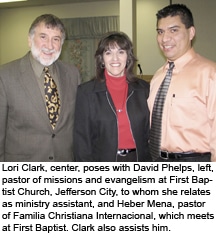 ing to church.
ing to church.
And she believes God engineered certain circumstances to help her survive.
Clark had been working for the Missouri Highway Patrol until three weeks before Michael's accident. "I knew that God knew…that in the position I was in at the highway patrol that I wouldn't be able to do it when Michael died," she said. A coworker mentioned that First Baptist needed a couple of ministry assistants. Three days later, Clark had a new job.
"[God] knew I would need comfort eight hours a day," she said. Phelps and pastor for adults Dennis Maxwell helped her hold on to her faith and to put the accident and its aftermath into perspective.
"In missions I have come full circle – from an area that missionaries supported and Christians supported with money and now to work with a person who directs work and money to missionaries," she said.
Tragedy to ministry
Lori has turned tragedy to ministry. Years ago, she had signed an organ donor card and had taught her children to consider doing so.
Michael had signed a card and at his death, his kidneys, pancreas, liver, a cornea, tissue, bones and parts of his heart were donated. Lori received two letters from recipients, including one from a mother thanking Lori for saving her son.
Six years ago, Clark was named to the Governor's Organ Donor Advisory Committee. She is often called to talk to families after the death of a loved one.
Shortly after her son's death, state police asked her to appear in a video about seatbelt use. Michael had not been wearing his at the time of the accident. The video is still used in area classrooms.
A compassionate friend
She also ministers through Compassionate Friends, an organization for parents of children who have died.
She accompanied a friend to a meeting. "Can I help myself if I'm helping someone else?" she asked at the close of that session.
"By the second meeting, I was doing more by helping others, and by the fourth meeting, I was one of the leaders," she said.
"If someone had a specific issue, I was the one who went and found the books and articles. As I helped them, I helped myself. God made us so different. What works for one doesn't work for others."
Lori always makes sure those she helps understand that God is her "number one way" to get through heartache. "No one has ever turned me down," she said. "I try to help them hold on to their faith. I got that guidance from David and Dennis."
She plans to "continue to be available for God to put whatever opportunities He wants to put in my path," she said.
She would like to learn John 3:16 in Farsi and one day hopes to have a chance to minister to Iranians. She remembers none of her native language, even though her adoptive father still retains the 20 words missionaries taught him when he adopted her.
Lori has had several opportunities to share her story in churches. She recently went on a mission trip to Mexico with First Baptist, where she has been a member for about a year. At a Mexican women's prison, she shared the story of her violent experience in her first marriage.
Clark holds no bitterness toward those who have hurt her. She had hoped to one day visit her birth father, but he died when she was 15. She said she never hated him because she felt he had only acted on his religious beliefs.
She is pleased that, although he never contacted her directly, he kept up with her whereabouts through missionaries. They let her know when he died.
Clark also kept in touch with her adoptive parents. Her mom developed Alzheimer's and lived in a nursing home until her death. Clark continues to visit her father.
"They did the best they could…. Next to God, I owe them…for the life I have. I have an extra appreciation to be here and to be exposed to Christianity."
She also remains on friendly terms with her second husband.
And she is "looking forward to asking God questions in heaven.
"Some people keep asking why, why. I asked why a couple of times," she said. "But it helps me to put those questions aside because I know I'm going to see God. I don't have to ask why now. Then I can ask Him face to face."
A bit like Habakkuk, Lori Clark can say, "Though my mom was murdered, though my adoptive parents beat me, though two husbands left me, though a son took the wrong road, though my child died, yet I will rejoice in the Lord."
And she leads others to rejoice as well. (03-10-06)

